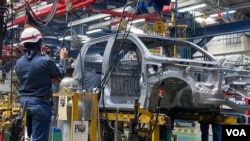Ecuadorian Antonio Oramas tries hard, but it’s not enough to stop himself from crying as he poses for a photo in front of a D-Max pickup truck, the last car his team will weld at the General Motors factory in Quito before the final closure of its operation on Friday, September 6.
At 43 years old, this plant is much more than a job to which Oramas dedicated 20 years.
“I have mixed feelings because we are running out of work (…) “It means a lot. The company is a great school for all of us who have been here. My children were born while I was in the company, they have been educated,” said Oramas, visibly sad.
“My children feel the same way because I told them that we are running out of work,” said the Ecuadorian, who, in addition to his two children, also has his wife and mother to look after.
The plant, which has operated since 2004 with some 260 employees, is closing amid pressure from local competitors, but the brand will continue to sell vehicles in the Andean country.
In addition to employees like Oramas who have been involved in production, the closure of the plant in Quito will also impact producers of components for these vehicles and other services that were contracted while the plant was operating, reported Juan Landázuri, director of manufacturing and quality at the General Motors plant in Quito.
The Cadillac and Chevrolet manufacturer had said last April that it would close its production operations in Ecuador and Colombia. General Motors’ plant in Quito accounts for 51% of car production in Ecuador.
Workers like Oramas are concerned about the current economic situation in Ecuador. “The situation in the country is very complicated. There are no jobs these days, so many people are emigrating. Imagine all the jobs that are being lost right now. People are going to keep emigrating,” he said.
Unemployment in the first quarter of the year in Ecuador was 4.1%, according to official figures.
Chinese cars are swarming Ecuadorian streets
The closure of the General Motors plant in Quito It coincides with the increase in the circulation of Chinese cars on Ecuadorian streets.
At least 34,756 units were sold in the first half of 2024, despite a slight slowdown in the automotive market during this period, according to figures published by the Association of Automotive Companies.
Landázuri told reporters that the factory will maintain its marketing model and said that this is a time of “great transformations.”
“What changes is the industrial part of the business model,” he said, referring to the plant’s closure at the end of this week.
The executive also said that the automotive industry and market have been undergoing significant changes over the years with the presence of competitors and trade agreements in force.
“This has made it highly competitive,” he said, referring to the fact that recently the plant’s industrial capacity has been used at 15% of the total, which is why executives decided to “bring new offers for customers to the portfolio.”
In 2023, for example, 9,985 units of the D-Max pickup truck model were assembled for the local market and this year, by the close of business on Friday, 8,200 of these vehicles will have been put into operation.
Landázuri said that production so far of about 1,000 of these vehicles per
month will be replaced by imported cars.
Competition and pressure
The automotive industry official said that Ecuador is not immune to competition and pressure “to find efficiency,” as occurs in neighboring countries linked to this sector.
“The environment has caused new car sales to be at a level with limited growth. Since the middle of last year there has been a contraction in total car sales,” said the director of manufacturing and quality at the General Motors plant in Quito, comparing with the first half of 2023.
Landázuri did not rule out that the signing of trade agreements, which are reflected, for example, in the sale of cars from countries such as China, may have had an impact on the current situation.
“We live in a country that has several trade agreements, including the one signed with China. The global competitive environment in general puts pressure on different industries, especially in countries with a low level of local industry,” he said.
Orientation program for workers
The director of manufacturing and quality at the General Motors plant in Quito said that a guidance program has been underway for four months that seeks to benefit 100% of workers who have become unemployed.
“We hired an international provider with whom we designed a program that is helping people determine the path they want to take in their professional transition,” Landázuri said.
As part of the program, a database was created that has been shared with different unions and associations so that they can contact these people according to their needs.
Oramas, who did not reveal what his next job will be, is closing a chapter.
“Life goes on, we have to continue. Keep fighting, keep moving forward and, until the end, provide quality and security,” he concluded.
Connect with the Voice of America! Subscribe to our channels YouTube, WhatsApp and the newsletter. Activate notifications and follow us on Facebook, X and Instagram.













Add Comment